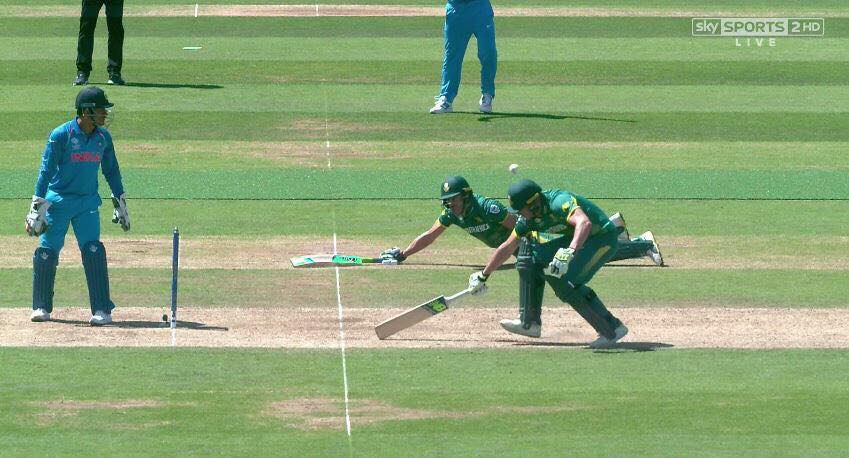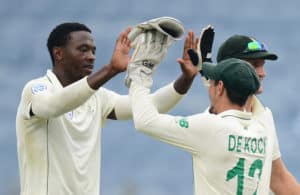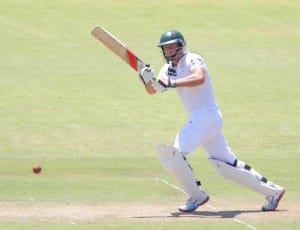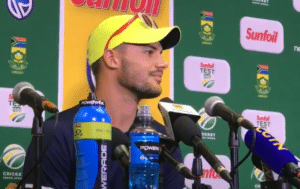Those inside the Proteas camp can say what they like about things not ‘going right’ for them on the day, but there aren’t many positives to pluck out of another wrecked ICC tournament campaign, writes GARY LEMKE.
This was car-crash watching for South Africans who have become accustomed to see the Proteas head into a tournament with a swagger in their step, happy to accept they are one of the favourites and pretending to feed off the hype.
What happened at The Oval against India, in what became a knockout match and saw South Africa bow out of the Champions Trophy – effectively finishing fifth in an eight-team ODI event at best – is now a familiar storyline.
And the sight of Faf du Plessis and David Miller rushing to the same end, a diving Du Plessis winning in a photo-finish as the bails were whipped off joyously at the non-striker’s end, is as defining to this tournament as was Allan Donald and Lance Klusener’s 1999 World Cup calamity at Headingley.
South Africa didn’t ‘choke’, as the vultures circle to pick away at the carcas. To choke you have to have to have set yourself up in a position to win and, at no stage of this match were the Proteas in with a chance. And that’s even after Hashim Amla and Quinton de Kock had moved the score to 76 before the first wicket fell in the 18th over.
By contrast, India were also 76-1 at the exact stage of their innings (17.3 overs), so those scores were identical.
The difference is that South Africa’s batsmen lost their way – the run-outs of AB de Villiers and Miller adding to the panic – with the batsmen, as was the case against Pakistan, unsure of what total to set.
This Oval pitch was a pre-used one and therefore slower than usual, so any 300 score ought to have been downgraded to a 270 as par. Even then it would have been tight against a quality India side whose habit is to be conservative at the front of the innings – since the 2015 World Cup they have been the slowest scorers of all the top nations in the first 10 overs – and then unleash their middle-order deeper into the innings.
Therefore, Amla and De Kock, when one looks at the comparatives, didn’t go hard enough at the top of the innings, and you could see when Du Plessis and De Villiers arrived at the crease they realised they had to step on the gas. That led to the run-out, and the next one.
From there it was into the all-rounders and South Africa lost their way in a panic, having no idea how to bat first under extreme pressure as they folded to 191 all out.
Stranger things have happened in cricket, but to win the game the Proteas had to take regular wickets, on a pitch that they by now would have known was playing slower than normal, so perhaps, just perhaps, they had a chance of making inroads into the India batting line-up.
Under such circumstances you’d expect the captain to throw the ball to the bowlers he reckons to have the best chance of taking wickets.
Imran Tahir came into the Champions Trophy the No 1-ranked bowler in the world. Against Sri Lanka, De Villiers waited until the 18th over before he had what he calls ‘a gut feel’ to bring on the inspirational wrist spinner. Tahir’s impact was immediate.
Against Pakistan, again where wickets were needed after another poor effort at setting a target when batting first, De Villiers introduced Tahir in the 15th over, but Pakistan were on their way already.
ALSO READ: AB as captain not working – Wessels
Against India, De Villiers threw Tahir the ball in the 17th over, with India already 70-1 and needing only 122 more runs off 34 overs with nine wickets remaining. He had no chance of reeling India in.
Tahir was used behind Kagiso Rabada, Morne Morkel, Andile Phehlukwayo and Chris Morris, yet he has been the most effective Proteas bowler in their surge to the top of the ODI rankings.
De Villiers later said he wants to captain the Proteas at the 2019 World Cup. His on-field captaincy at the Champions Trophy was uninspiring, the players looked off their game and De Villiers himself had a poor tournament. It’s as if he was captaining by numbers, not by feel. South Africa have also been ordinary in England, losing four of their six ODIs since arriving.
COLUMN: SA batsmen are chronic failures
It would be a poor decision to retain De Villiers as captain, and he’ll be 35 in 2019. He has also already chosen when to make himself available for South Africa and when not to; hardly the most inspiring act you’d like to see coming from a national captain, no matter the format.
Russell Domingo, as coach, has done his chances of remaining at the helm after the England tour no favours – Geoffrey Toyana, are you padded up? – and despite their protestations, a top-class psychologist needs to be brought into the system.
There is renewed mental scarring in this Proteas outfit and the pressure on them in 2019 will be enormous. They aren’t ‘chokers’ in the true sense of the word, but try telling that to the other nations in the ICC family.
Photo: Philip Brown/Getty Images





